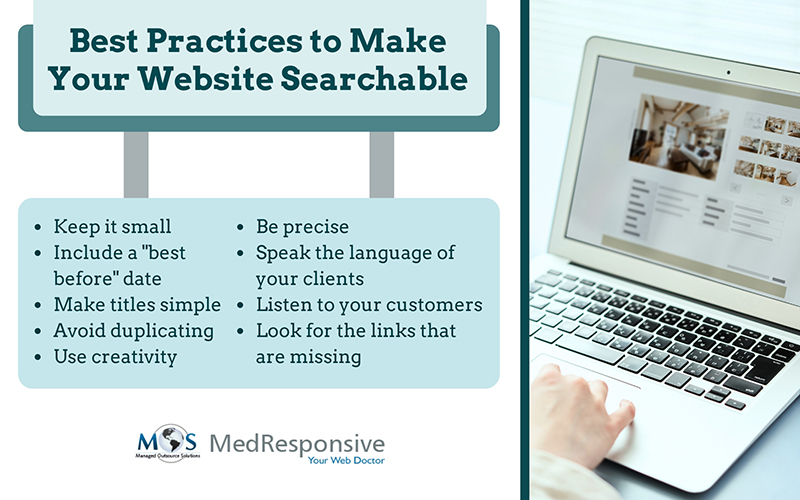For businesses of all sizes and sectors, having a website and a robust online presence has become essential. Having a website is like opening a shop in a busy city, and the true difficulty is standing out from the hundreds of other businesses fighting for customers. This is where search engine optimization becomes important. A reliable provider of organic SEO services can help make your website more searchable.
Importance of Making Your Website Searchable
A “searchable” website improves its visibility on Google and offers users a better search experience. To put it another way, it makes your website more likely to be found by potential customers and enhances the likelihood of them becoming repeat visitors. Making your website searchable is essential for driving targeted traffic, increasing brand awareness, building trust, gaining a competitive edge, and achieving long-term success in the digital landscape. It is a foundational element of effective digital marketing and business growth strategies.
When done well, site searches can provide up to 13.8% of total income; yet, when done incorrectly, the consequences can be severe, as 88% of users are unwilling to return to a website following a negative encounter. The solution consists of a blend of best practice content strategies and tools, like results promotion, analytics, and strategic auto-completion.

Tips to Make Your Site Searchable
- Keep it small: The goal of search is to swiftly locate the information you require. It’s not good if an employee searches your website for “long service leave” and the results show up as a PDF file including your whole personnel management policy. To make it easier for customers to obtain the precise response they need, you might choose to publish longer materials on your website as different chapters or sections.
- Include a “best before” date: Knowing if a piece of content is more than a year old can make the difference between it being helpful and useless, depending on the subject. Make sure the date metadata is accurate by setting up your web server to deliver the correct document changed dates to the HTTP headers or by publishing the page-level date in a format that is supported.
- Make titles simple: Title tags are essential for creating a robust information trail because they are frequently utilized as the names of search results. Users will be able to understand the result’s content, purpose, and context if page titles are clear and concise.
- Avoid duplicating: Poor metadata is worse than none at all, therefore resist the urge to use the same metadata on every page. However, good metadata can also be utilized to offer faceted navigation. Instead of using the auto-generated snippet, use metadata for presentation reasons. For example, offer the metadata abstract.
- Use creativity: Use your imagination while crafting link wording. When you create links in your HTML, the words that make up the hyperlink’s text are known as link text. Refrain from utilizing link language such as “Click here” or “More.”
- Be precise: It’s very possible that the word “dogs” is already scattered throughout your website if dogs are the topic matter. When building topic-specific pages, bear this in mind and make sure to properly demarcate topics. If the website you’re writing is about “golden retriever,” for instance, always use the phrase “golden retriever” instead of “dogs” to make it easier for readers to search articles about that topic.
- Speak the language of your clients: A query word should appear on your page as much as possible (within reason; it still needs to sound natural). Make an effort to employ vocabulary that is appropriate for the intended audience, try to utilize terms that they could use in their searches, and make sure these terms appear in the titles, content, and anchor text. Keep in mind that your company probably uses more formal language than the average person.
- Listen to your customers: There are several analytical tools that can assist you in learning more about the queries your clients are putting in. One such tool is the “top query” report, which lists the most frequent searches and ranks them. With time, this data will provide you with the knowledge you need to decide what should be the priority when it comes to the upkeep and content of your website.
- Look for the links that are missing: Although monitoring your most often used searches will assist you in better content prioritization, the following are some of the key non-matching query reports that you should be aware of:
- Missing information. People looking for material on your website that is not available. This is a great chance to fill the void on your website by adding the missing material if the search query is valid. You may still enhance the search experience even if the user’s query isn’t related to your website by sending them to another website where they have a better chance of finding what they’re looking for.
- Common spelling mistakes. Whether on purpose or not, people frequently misspell words; this issue hasn’t been made any better by the rise in mobile usage.
Have you heard of Parasite SEO?
Read our blog post: What Is Parasite SEO? How Does It Work?
Arguably, the most crucial element of your website is being searchable. Consumers desire speedy access to the information they require. Customers are more inclined to buy from you and, more crucially, to trust you if they can discover such information on your website. Your only task is to assist them. The goal of organic SEO services is to optimize different parts of your website, which can make your website more searchable.




